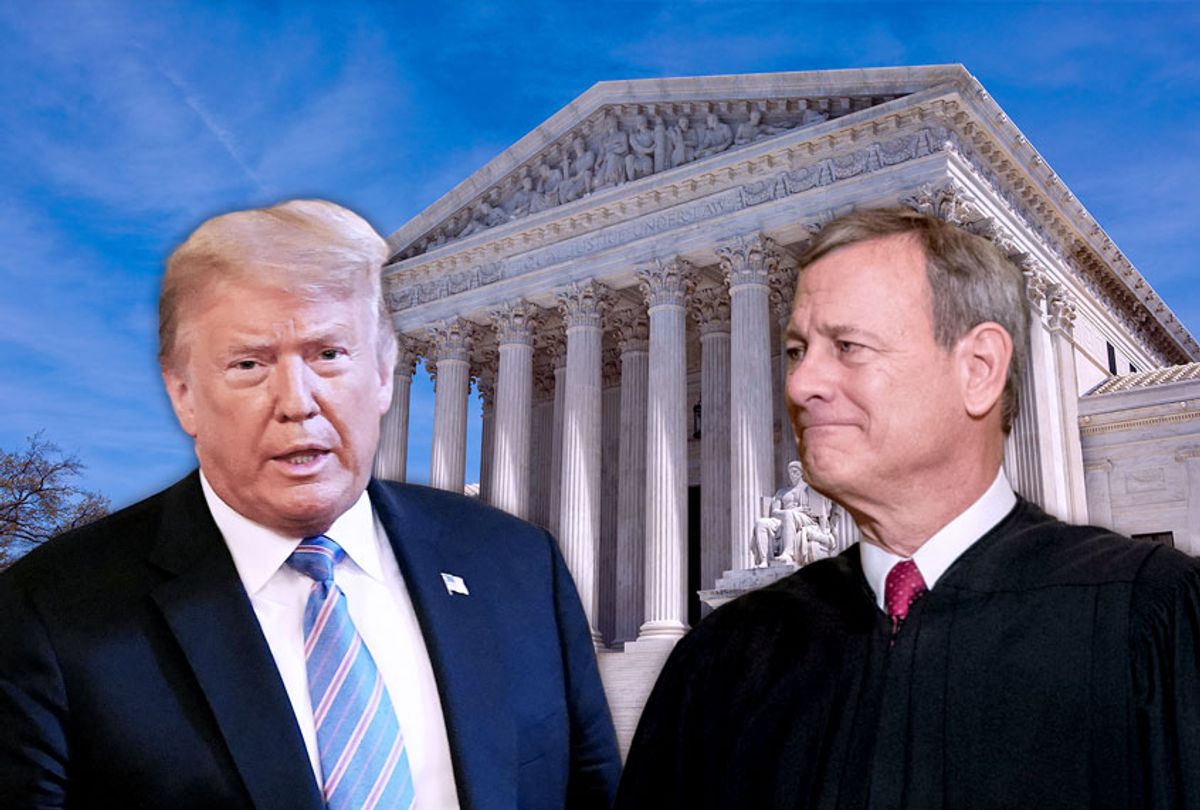Even some of the liberal justices on the Supreme Court appeared skeptical on Thursday of a Colorado court’s decision to bar former President Donald Trump from the ballot under the Constitution’s “insurrection” clause.
Justices Elena Kagan and Ketanji Brown Jackson joined the court’s conservatives in expressing skepticism about states’ ability to disqualify Trump under Section 3 of the 14th Amendment.
"I think that the question that you have to confront is why a single state should decide who gets to be president of the United States," Kagan told attorney Jason Murray, who represents a group of Colorado voters. "What's a state doing deciding who other citizens get to vote for for president?"
“It’s just more complicated, more contested and, if you want, more political,” Kagan also argued.
Jackson questioned whether the 14th Amendment applies to the presidency.
Chief Justice John Roberts expressed concerns about the stakes in the case.
"It'll come down to just a handful of states that are going to decide the presidential election," he said. "That's a pretty daunting consequence."
Justice Amy Coney Barrett suggested that “it just doesn’t seem like a state call.”
Trump attorney Jonathan Mitchell argued that states cannot even ban an “admitted insurrectionist” from the ballot because the amendment only applies to someone “holding” office and because Congress could vote to lift "that disability after the election” by issuing a waiver.
Mitchell also argued that the president is not an “officer of the United States” under the amendment, which also drew skepticism from justices on both sides.
Mitchell also argued that Jan. 6 was a “riot” and not an insurrection and that the constitutional ban is not “self-executing” because it could be overridden by Congress.
Murray rejected Mitchell’s claim that the president is not an officer of the U.S.
"President Trump's main argument is that this court should create a special exemption to Section 3 that would apply to him and to him alone," Murray said.
"President Trump disqualified himself," he later added.
Legal experts widely predicted that the court would overturn the Colorado Supreme Court’s ruling and reinstate Trump to the ballot — and that even the court’s liberals may join the conservative majority.
“Based on today's argument, it sure sounds like a clear majority of justices (including perhaps one or more Democratic appointees) will issue an opinion that finds that Section 3 of the Fourteenth Amendment is not ‘self-executing,’ which would put Trump back on the ballot,” tweeted former federal prosecutor Renato Mariotti.
Michigan Law Prof. Leah Litman predicted that Roberts’ questioning signaled that the court is likely to rule that “states can’t disqualify federal officeholders” without congressional permission.
We need your help to stay independent
“It’s becoming clear they are going to hold states can’t disqualify,” wrote Georgia State Law Prof. Eric Segall, predicting “Trump is going to win this case.”
Rick Hasen, a law professor at UCLA, agreed that it seems “pretty clear” based on the questioning that the court is likely to rule that states cannot disqualify federal officers.
“Important to note that the liberal Justices are not pushing back on this argument about the federal interest here. Suggests the cake is already baked. Perhaps they've also been discussing the immunity case and whether to let that go to trial and not grant a stay next week,” he tweeted, predicting that it “would not be surprising to see a quick 9-0 or 8-1 ruling” reversing the Colorado decision with liberal Justice Sonia Sotomayor the only “question mark.”
Steve Vladeck, a Supreme Court expert at the University of Texas, predicted a ruling “between 7-2 and 9-0 for the very specific proposition that states can’t unilaterally disqualify candidates running for President on the ground that they engaged in insurrection.”
Want a daily wrap-up of all the news and commentary Salon has to offer? Subscribe to our morning newsletter, Crash Course.
“I'm sensing we get an 8-1 decision with Sotomayor in dissent on a very narrow question that will make no sense but effectively punt the issue for another day,” opined Georgia State Law Prof. Anthony Michael Kreis.
“I’m starting to think the ‘off ramp’ here is the Supreme Court says there’s a difference between running for office and holding office and then they wait for Judge Chutkan to get a trial going, see what happens in November, and then revisit the substantive question if needed,” he predicted.
Former acting Solicitor General Neal Katyal criticized the attorneys for the Colorado lawyers.
“You need to say about the other side, ‘you are gutting the Constitution, Donald Trump,’" Katyal said on MSNBC. "You need to say to the court, ‘look, for years you have staked yourself on a strict construction of the document, on the original intent of the document. The original intent was to clear against Donald Trump.’ You need to be using their methodology that they have used to say, look, you have to be consistent with what you have said before. We heard none of that today. I'm not sure why. That makes it, frankly, a really easy case for the U.S. Supreme Court to decide in favor of Donald Trump."
Read more
about the Trump ballot challenge
- Of course Trump's Supreme Court lawyer is the same guy behind Texas' sadistic abortion ban
- “Bizarre”: Legal experts warn Trump’s Supreme Court argument is a “massive tactical blunder”
- Booting Trump from the ballot is the best way to prevent a second Jan. 6
- Legal scholars: Trump made “dangerous” gamble in bid for Supreme Court to keep him on ballot
- Constitutional scholar explains why "treason" is a key topic in Trump’s 14th Amendment SCOTUS appeal



Shares